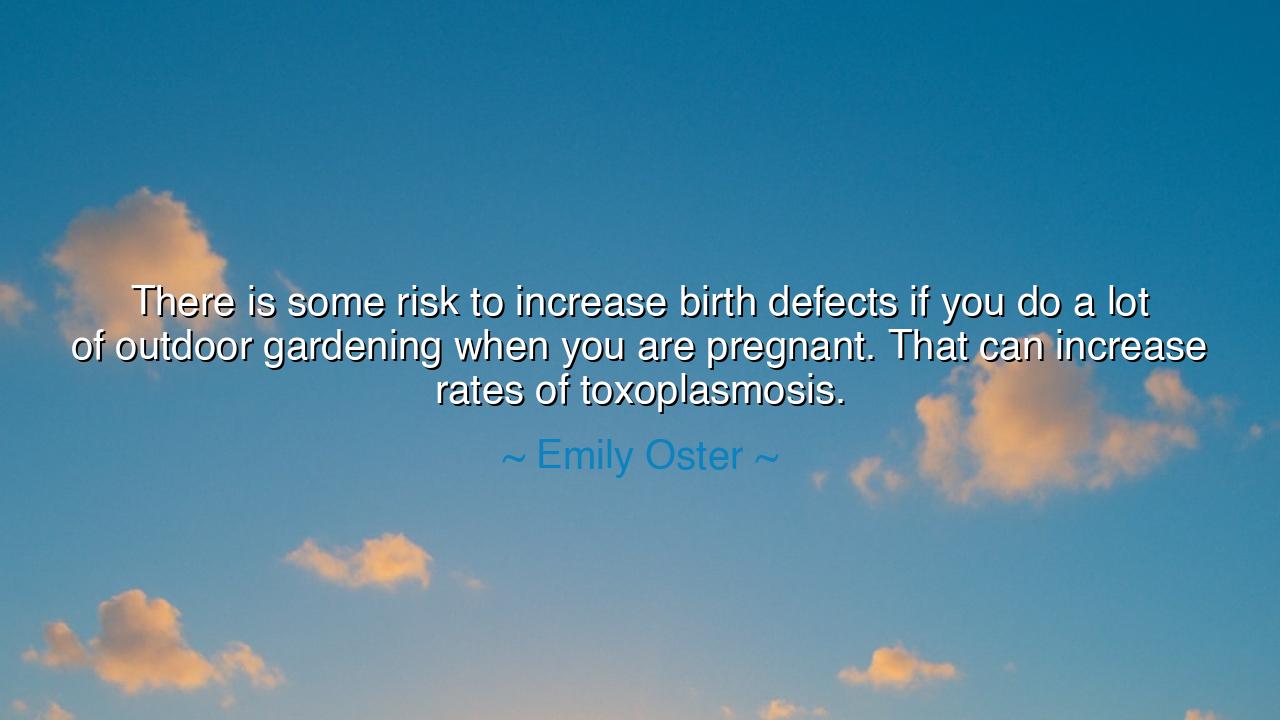
There is some risk to increase birth defects if you do a lot of
There is some risk to increase birth defects if you do a lot of outdoor gardening when you are pregnant. That can increase rates of toxoplasmosis.






In the ancient dance of life, there is a sacred bond between nature and the human body. To live in harmony with the earth is to honor the forces that both sustain and shape us. Yet, as Emily Oster cautions, "There is some risk to increase birth defects if you do a lot of outdoor gardening when you are pregnant. That can increase rates of toxoplasmosis." These words are a gentle reminder that while nature offers us profound beauty and healing, it also requires wisdom and caution. In ancient times, our ancestors understood the delicate balance of the earth—how it nourishes, but also how it can pose danger if not approached with respect and care.
The ancient world was filled with stories of both the benevolence and the danger of nature. The Greek gods, often seen as personifications of the natural world, embodied both the gifts and the threats posed by nature. Artemis, the goddess of the hunt and the wilderness, was a protector of wild creatures, but also a reminder that the forest could be both a place of life and death. Similarly, Demeter, goddess of the harvest, bestowed the gift of crops and fertility but also understood the perils of the land. Oster’s warning echoes this ancient wisdom—that nature is not only a giver of life but can also be fraught with hidden risks if we do not approach it with knowledge and respect.
In the ancient civilizations of Egypt and Mesopotamia, agriculture was revered, but there was always an understanding that the land had its mysteries—both life-giving and life-taking. The Egyptians were deeply connected to their environment, and their spiritual practices often included rituals to protect the land and the people from unseen dangers. Likewise, the Mesopotamians used careful rituals to protect their crops and ensure safe harvests. These rituals were born from an understanding that while the earth could provide abundance, it could also harbor risks that required both respect and action. Oster’s words remind us that even in today’s world, where the earth is known and studied, we must still exercise caution in our dealings with it, particularly in delicate times such as pregnancy.
Toxoplasmosis, the risk Oster speaks of, was known in ancient times not by its name, but through the tales of the invisible forces that shaped health and illness. In medieval Europe, it was common to fear the unknown forces that could harm pregnant women, whether through unseen illnesses or the mysterious powers of nature. The plague, for instance, was a great terror, not just because of its deadly reach, but because of its invisible nature. What Oster speaks to is a modern understanding of something ancient: that nature, while beautiful, is not always fully understood, and its effects can be subtle but profound.
Consider, too, the ancient practice of herbalism, where remedies for ailments were derived from plants, many of which held both healing properties and potential risks. The wise herbalists of old knew that planting, harvesting, and using plants required knowledge—knowledge that came not just from books but from experience, observation, and sometimes, even the sacrifices of trial and error. The ancient Romans understood that herbs could heal, but also that certain plants could be poisonous if handled improperly. They recognized that the earth’s gifts were both a blessing and a challenge. Oster’s cautionary message about gardening during pregnancy speaks to this ancient understanding that while the earth offers us abundance, it requires discernment and wisdom.
The lesson from Emily Oster’s words, then, is one of balance and awareness. Just as the ancients knew the importance of honoring the earth while also recognizing its risks, so must we today. Gardening, with its deep connection to the earth and to the cycles of life, can be a deeply spiritual and fulfilling act. Yet, in certain circumstances, such as pregnancy, we must approach it with caution, understanding the potential dangers that exist within the soil—dangers that may not be immediately visible, but that can have profound effects on life’s delicate balance.
So, let us take from this lesson a sense of both respect and responsibility. The earth is both a nurturing force and a realm of unseen forces. When we are in a vulnerable state, such as pregnancy, we must be wise in how we interact with it. Let us approach gardening with the same care that we would approach any sacred act, recognizing that it is both a source of life and a reminder of the complexities of nature. In doing so, we honor the ancient wisdom that teaches us to live in balance with the earth, to understand its rhythms, and to protect ourselves and those who are most vulnerable. May we, like the ancients, cultivate a relationship with nature that is both respectful and aware—one that nourishes and protects, even as it challenges and teaches.






AAdministratorAdministrator
Welcome, honored guests. Please leave a comment, we will respond soon